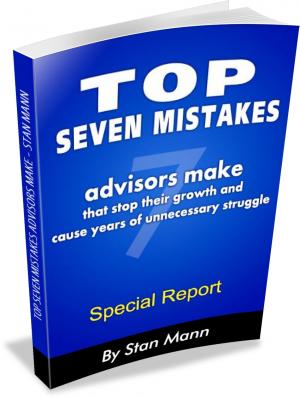Read This, Or Suffer Like I Did
I’m a big believer in not reinventing the wheel. So when I started my practice I simply created my advertising and marketing like all the other coaches did.
BIG MISTAKE! Little did I realize 99.8% of businesses approach marketing in the wrong way. That goes for financial advisors too.
Here’s what I learned by trial and error in the school of hard knocks.
Mistake: Talking about myself instead of my target market (or worse, not having a target market at all)
When I started my advertising and website I talked about the schools I attended, my certifications and my coaching process. I never got around to explaining what results clientswould get from my coaching.
How about you? Does your promotional material, like your brochure, website and LinkedIn profile, start out with your title? Does it go on with what you do and how you do it? Do you list your products using terms only you, other advisors, and savvy clients can understand?
That’s how mine were. I explained how our coaching relationship would create “synergy.” Doesn’t that grab you? Who wants synergy and what the heck is it? Only other coaches know. I also said that I acted as a sounding board. I don’t think many people were wild about investing in a sounding board. I wasn’t getting many clients.
I see the majority of financial advisors make the same mistakes. Take a random tour of financial advisors’ websites and you will see advisors talking about themselves with barely a nod to their audience. They will talk about their own training and certifications, awards and commendations. They’ll have a long list of their services and products—nothing about benefits or results.
Some will do a little better with a mission statement that explains what they want for their clients—better, but no cigar.
These are all the mistakes I was making until my coach wised me up. He helped me choose business owners as my target market so I knew whom I was talking to. My website now starts with asking, “Are you a business owner looking to grow your business faster?” A business owner will know he’s in the right place. Someone wanting to lose weight could leave.
I corrected two important mistakes:
- I chose a target market to sell my services to.
- I started addressing this specific market—business owners.
Your message is much more appealing when focusing on a specific group . It’s like the difference between, “Hey you,” and “Hello Mr. Businessman.” My advertising material became even stronger when I was able to say, “Hello Mr. Financial Advisor.”
If you’re a financial advisor, you’ll grab the reader’s attention if you are able to say something like: “I help Boeing executives with their plans to retire,” as opposed to, “I help people with their plans to retire.”
Let’s take a look at how this works. Just for the sake of illustration, we’ll assume that you have some Boeing executives as clients and understand the ins and outs of their retirement packages. We’ll start out with the weakest message and keep making it stronger. I’ll put a prospect’s probable thoughts in parentheses.
- “I do retirement planning.” (Who for? Are talking about your own retirement?)
- “I help people plan their retirement.” (Oh, you’d help me with my retirement.)
- “I help executives plan their retirement.” (I’m an executive. You must be better than the guy who just helps people.)
- “I help executives at Boeing aircraft plan their retirement.” (I’m a Boeing executive. I might talk to you.)
- “I help Boeing executives choose their retirement options wisely and reach their retirement goals.” (Sounds like you really knows your stuff. I’ve got so many choices I’m not sure what to do. Let’s talk.)
A Boeing executive will ignore the first three messages. You can see how he would get interested in Message 4 and really be grabbed by Message 5. If you specialize in working with Boeing executives, you have a killer marketing message with something like the last option.
I know you’re worried that a Ford Motor Company executive might read Messages 4 or 5 and move on to somebody else. But I guarantee you he won’t move on to somebody who has a generic message like the first three.
Using Message 5, you’re way ahead of the game. You gain a Boeing executive and lose a Ford Motor executive (whom you wouldn’t have gotten anyway using a generic message.) The generalist gains nobody.
You also can see how much easier it is to focus your advertising more sharply. It makes all your writing much easier.
I know having financial advisors like you as a target market makes it easier for me. I know some of your code words and can talk your language. You use “practice building” in place of prospecting and selling. I learned that AUM was not a word use repeatedly to induce a meditative state.
If you have a niche or target market, you, too, can learn how your prospects talk. When you use some of their private language, they are attracted to you.
I hope you learn from my mistakes and save yourself years of struggle.
Have questions or comments? Join the discussion and I’ll reply.




 Tell a Friend
Tell a Friend Book a Meeting
Book a Meeting Contact Us
Contact Us